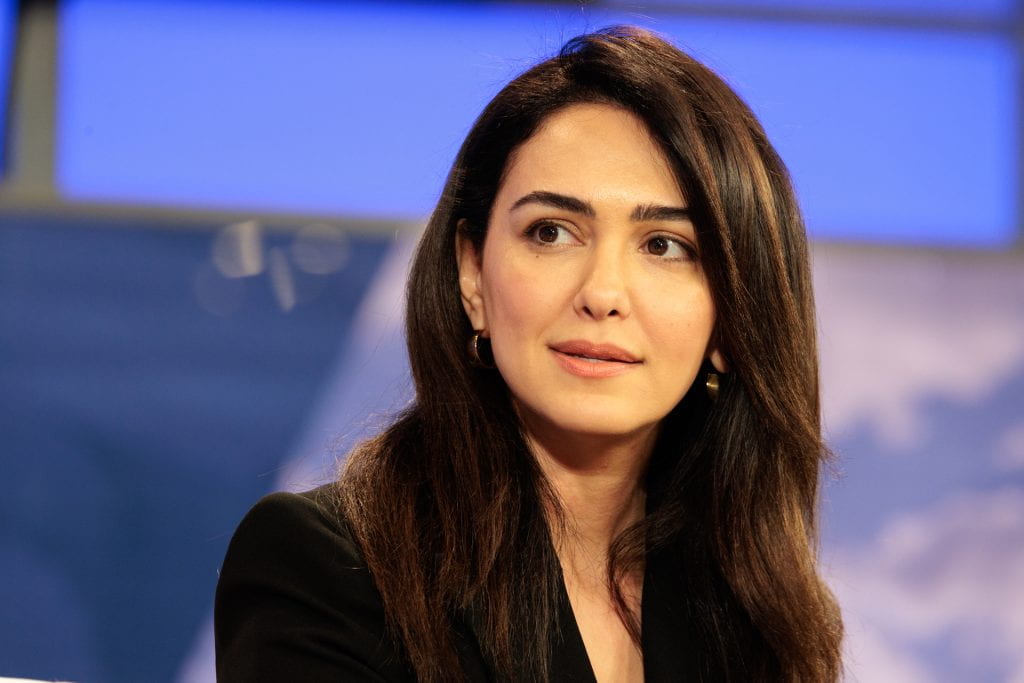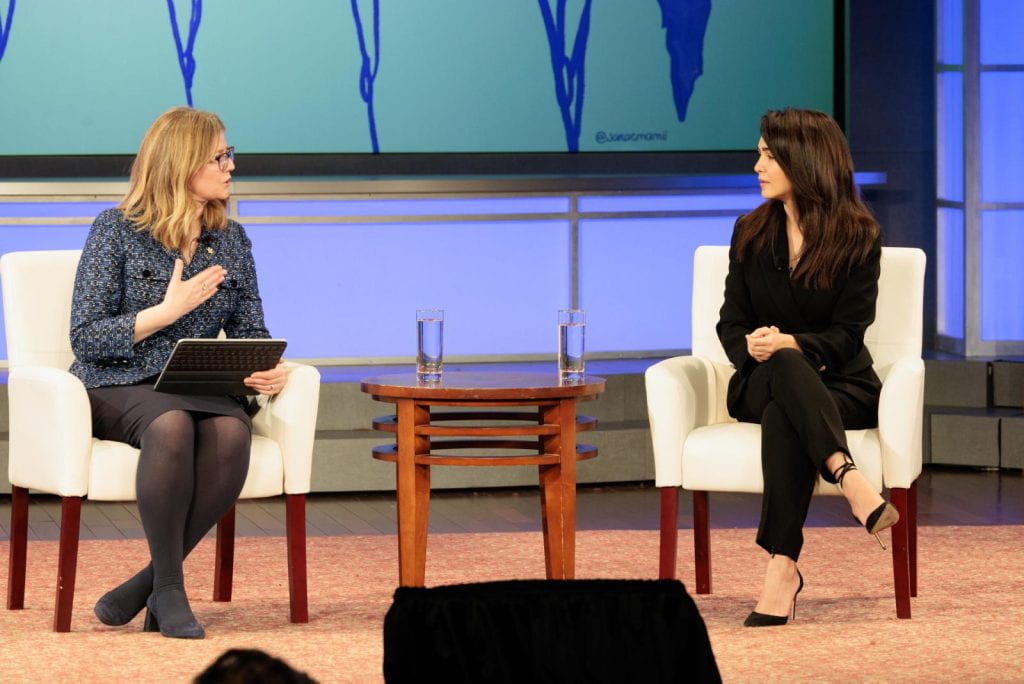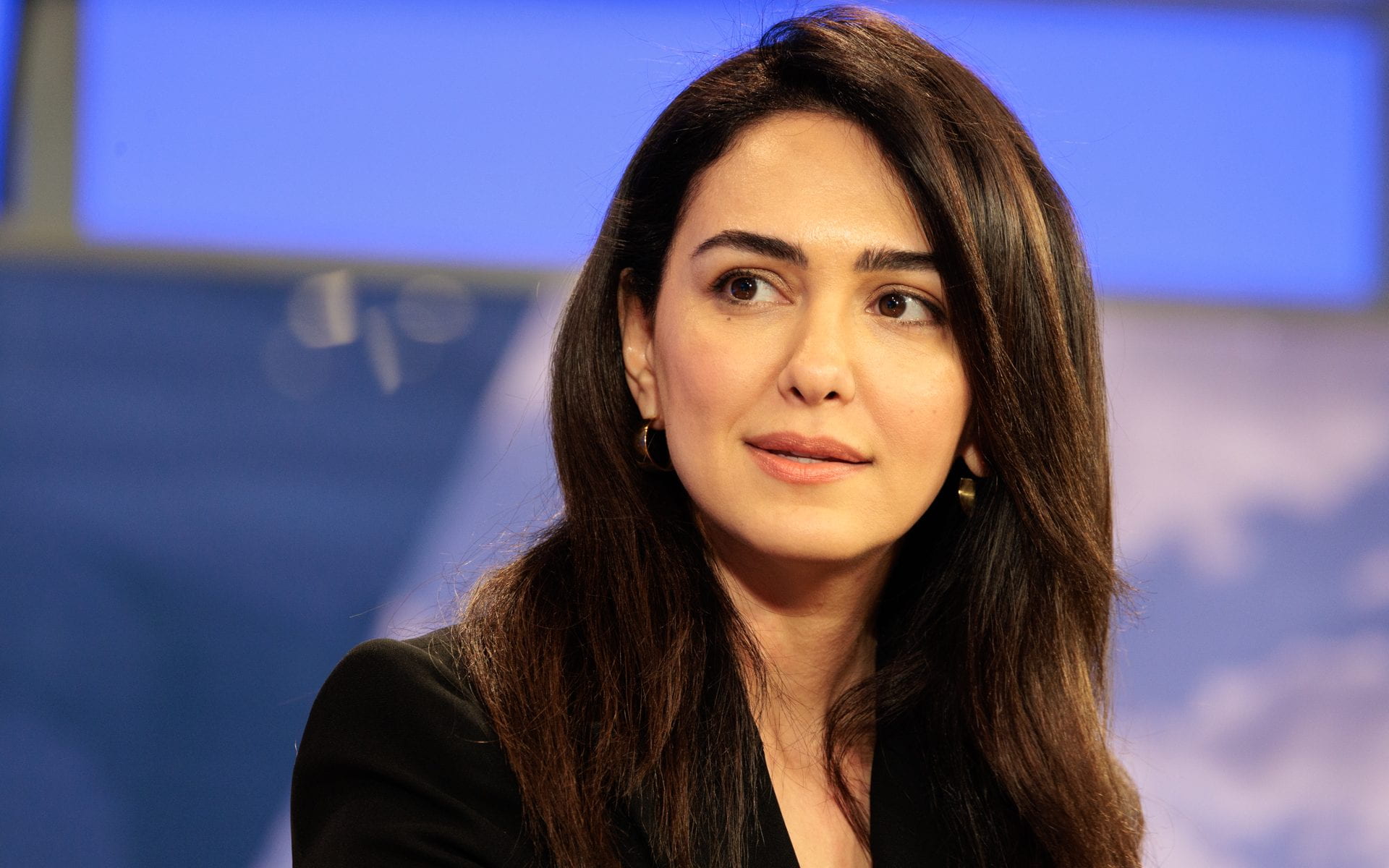Iranian born actor and activist Nazanin Boniadi provided an Elliott School audience an update on the progress and status of Iran’s freedom movement.
Authored by: B.L. Wilson

It’s been more than a year since Mahsa Jina Amini died after being detained by Iran’s morality police for not properly wearing a veil, the hijab that is mandatory under the Islamic Republic’s laws.
The Elliott School of International Affairs invited Iranian born actor and activist Nazanin Boniadi for a conversation not only about the status of women in Iran since Amini’s death, but also on the “The Role of Unity in Advancing Democracy for Iran.” The conversation was led by Alyssa Ayres, dean of the Elliott School, and was held at the Jack Morton Auditorium Tuesday.
In opening remarks before the start of the discussion, Mary Ellsberg, executive director and founding director of the George Washington University’s Global Women’s Institute, said the 22 year old’s death sparked protests that gave rise to the Women’s Life Freedom Movement in Iran and across the diaspora. It prompted thousands of Iranian women to flood the streets, remove their veils and cut their hair, and inspired women across the globe to raise their voices against the repressive and dangerous regime, said Ellsberg, who also is a professor of international studies at the Elliott School.
Boniadi, who has been featured in television shows and movies from “How I Met Your Mother” to “Lord of the Rings,” said her “first protest” was in the womb of her 19-year-old mother who was heavily pregnant but had “the foresight to see what was happening to Iran during the Iranian Revolution in 1979.” Her parents joined a minority of Iranians protesting the newly formed government and were forced to flee or risk execution.
The Women, Life, Freedom Movement, said Boniadi, transcends women’s rights though women were the spark and engine. “It is a declaration of opposition to a regime that is not only misogynistic, but murderous and repressive, a perfect rallying cry for democracy, for representative and accountable government that includes women,” she said.

When Ayres asked what toll activism has taken on her, Boniadi mentioned the death threats she has received and the time it has taken away from her career but added that that “pales in comparison to what the Iranian people are going through.”
“The artists and activists, my counterparts in Iran saying these same words lose their careers, they get sent to prison, they get lashed, they get killed, blinded, raped, tortured, forcibly disappeared,” Boniadi said. “The list goes on and on. That puts it in perspective for me.”
Organizations such as Amnesty International and Human Rights Watch report that more than 500 Iranians have been killed (the vast majority of whom were men) and thousands more arrested since the protests began. Boniadi said she is invited to speak, write articles and receives accolades including membership in the Council on Foreign Relations, the leading think tank on U.S. Foreign Policy and national security. She has been awarded the Sydney Peace Prize, Australia’s international prize that recognizes leading global voices that promote peace, justice and nonviolence.
“Though victories are few and far between,” she said, “every time a family is reunited after a hostage has been taken or someone is freed after being wrongfully imprisoned or an execution is stayed or an unjust law is overturned, it provides fuel to keep going.”
Setbacks have come on the heels of victory. Members of what Boniadi calls the community of democracy took the unprecedented step of getting the Islamic Republic of Iran ousted from the UN Commission on the Status of Women, something they were told could not be done. They fought for it, she said, to prevent the regime from using the UN system to legitimize themselves on the global stage and to give hope to people in countries like Afghanistan. The democracy community won only to face two major setbacks months later. Iran’s envoy to the United Nations was elected Vice President of the UN General Assembly and chair of the UN Human Rights Council.
She said the member states had been working in concert with the Islamic state while dissidents from Russia, Venezuela and Iran were fractured and fighting each other. Autocrats and oppressive governments united in their objective to stay in power and found influential voices among the opposition to divide and rule. “Democracies failed to be as united,” she said.
“Until we understand that we are inextricably bound, all democratic people, democratic loving people, inherently tied to each other, and we have to work on common objectives and safeguard democracy not only in our countries but also ensure that democracy prevails worldwide, we will fail,” she said.
The event was co-sponsored by the Elliot School for International Studies, the Global Women’s Institute, the Institute for Middle East Studies, the Elliott School’s Diversity, Equity and Inclusion Initiative and the Columbian College of Arts and Sciences Gender, Sexuality, and Studies program.

